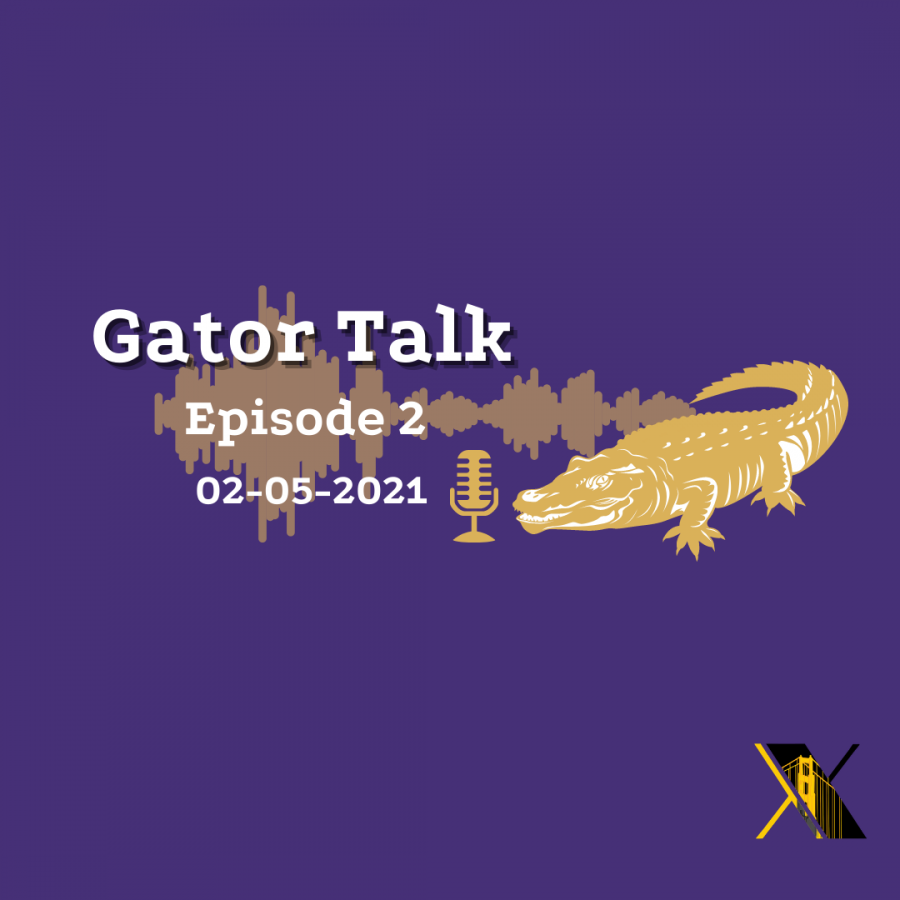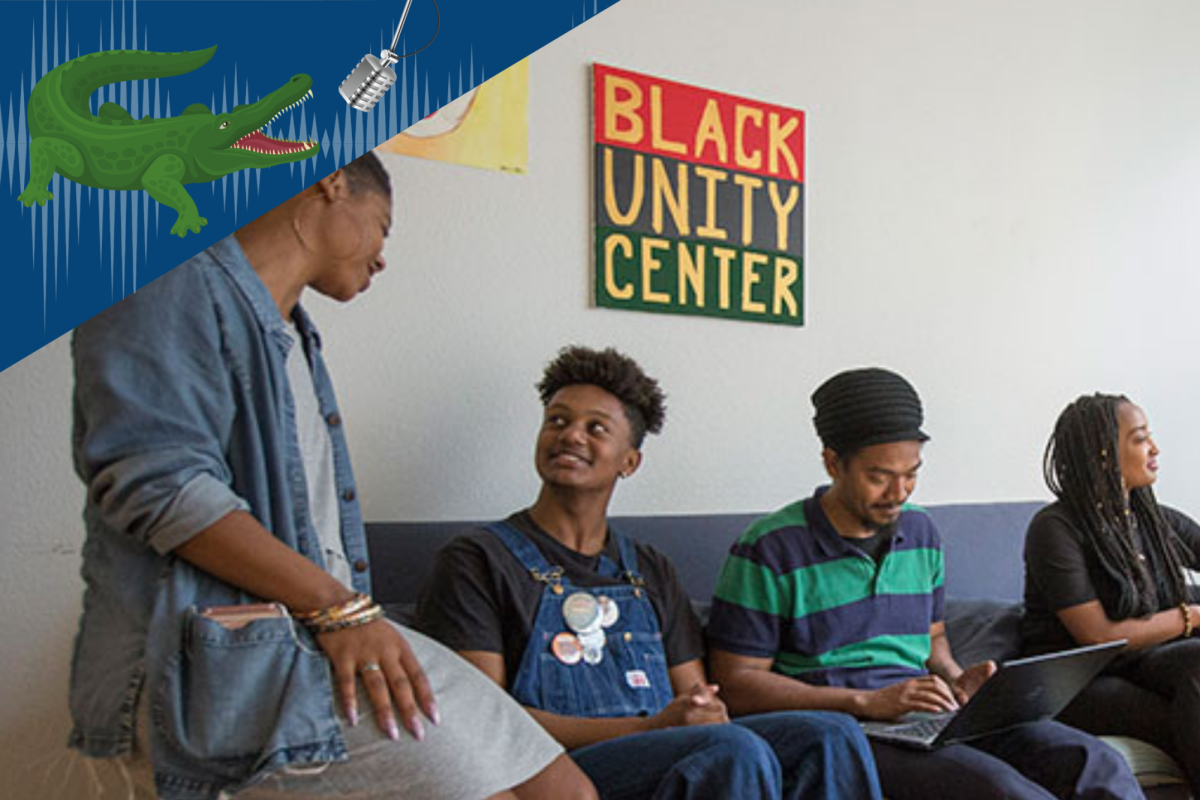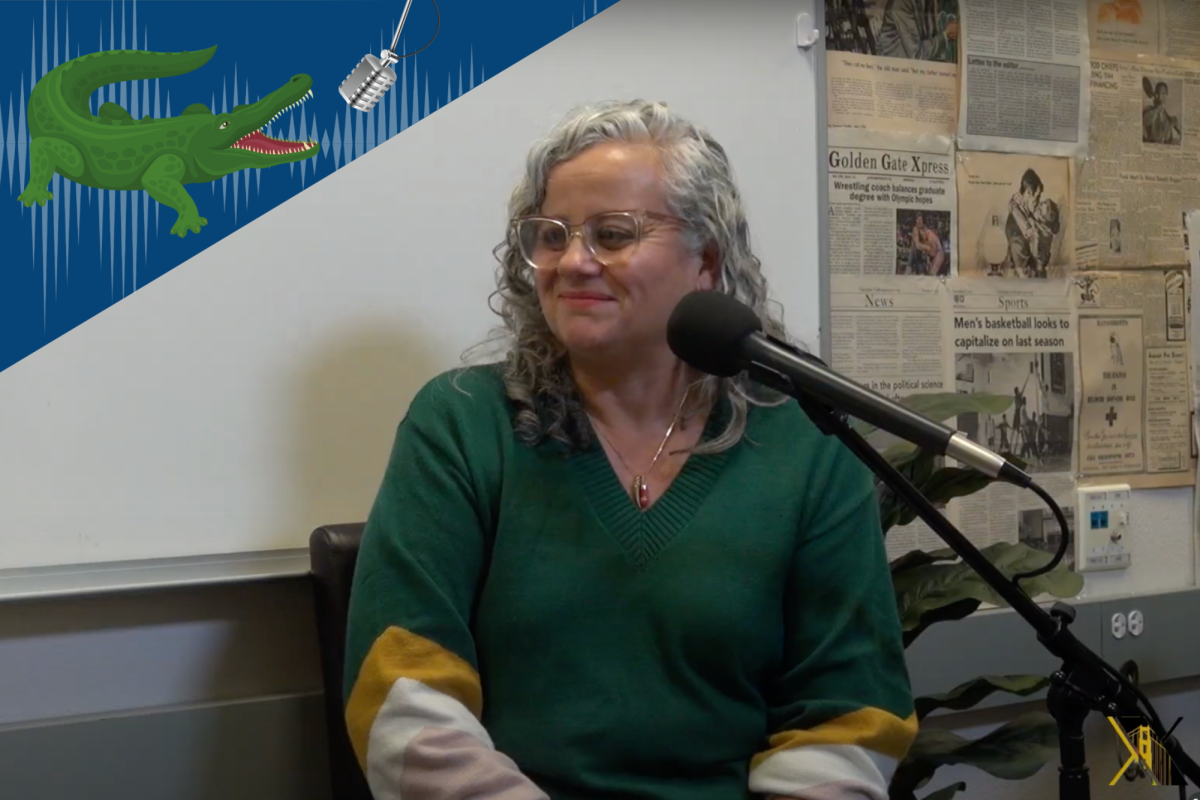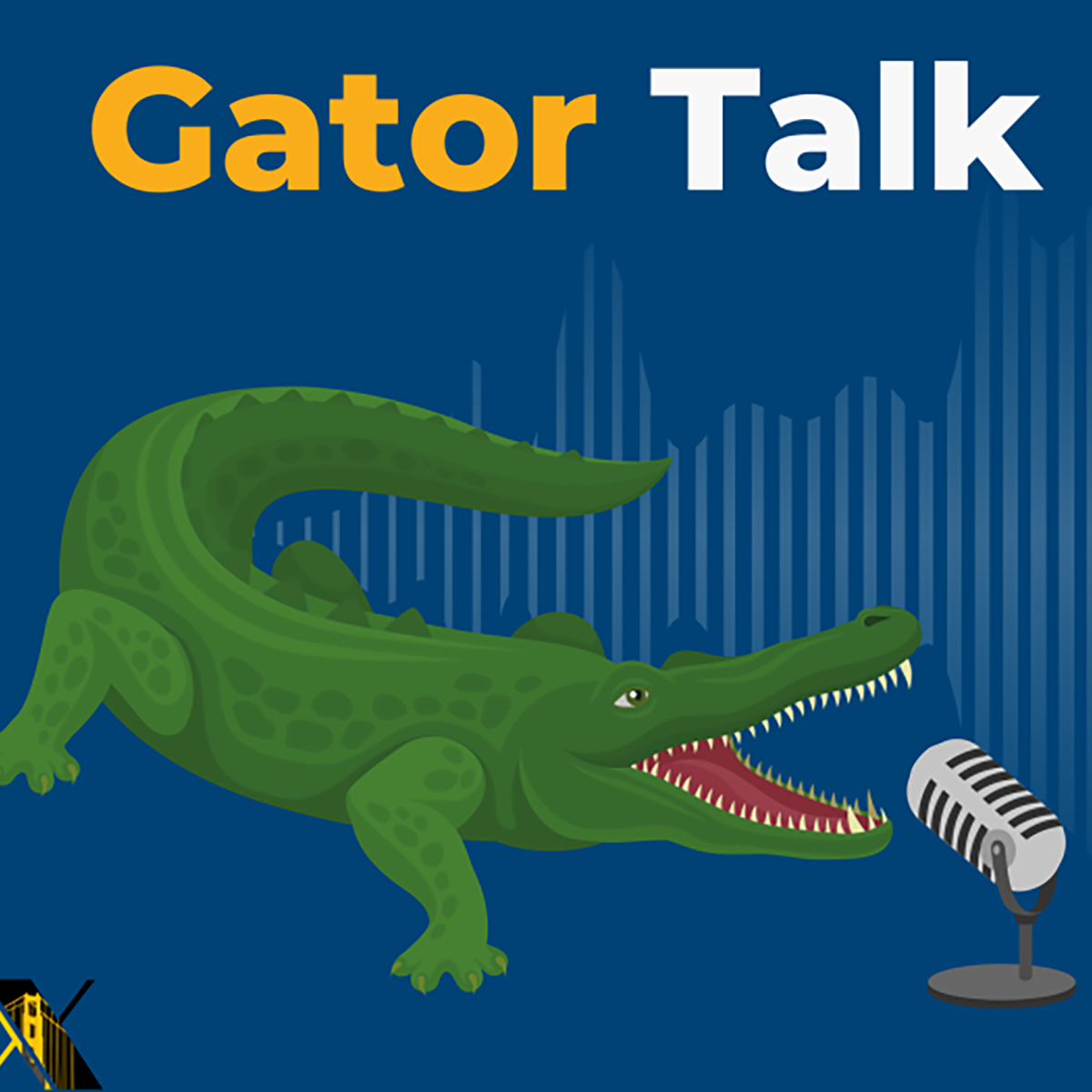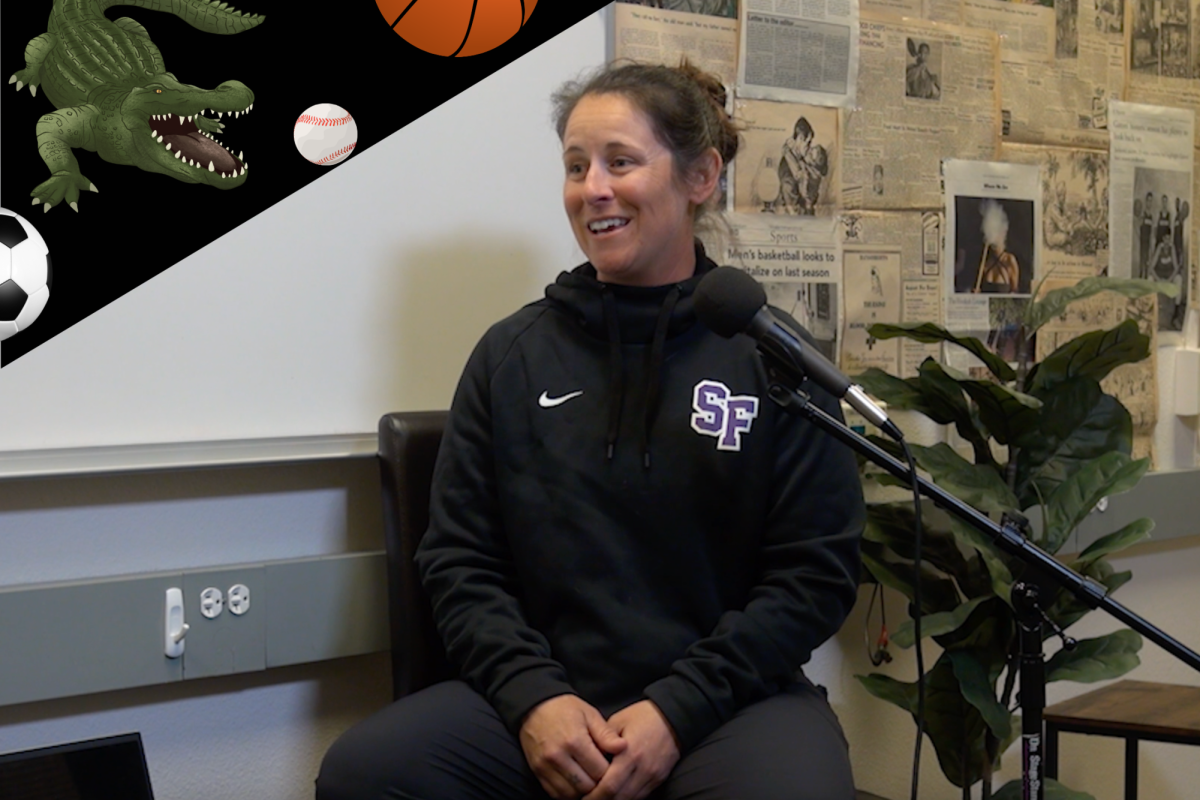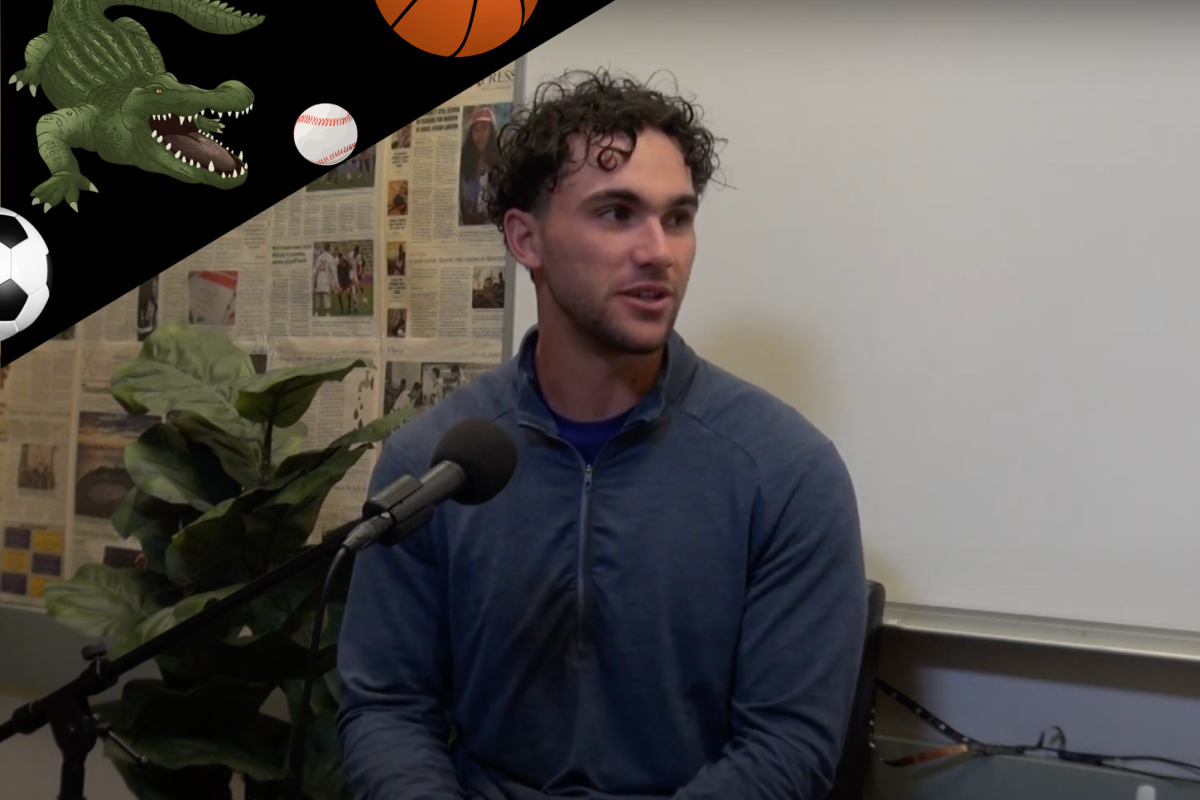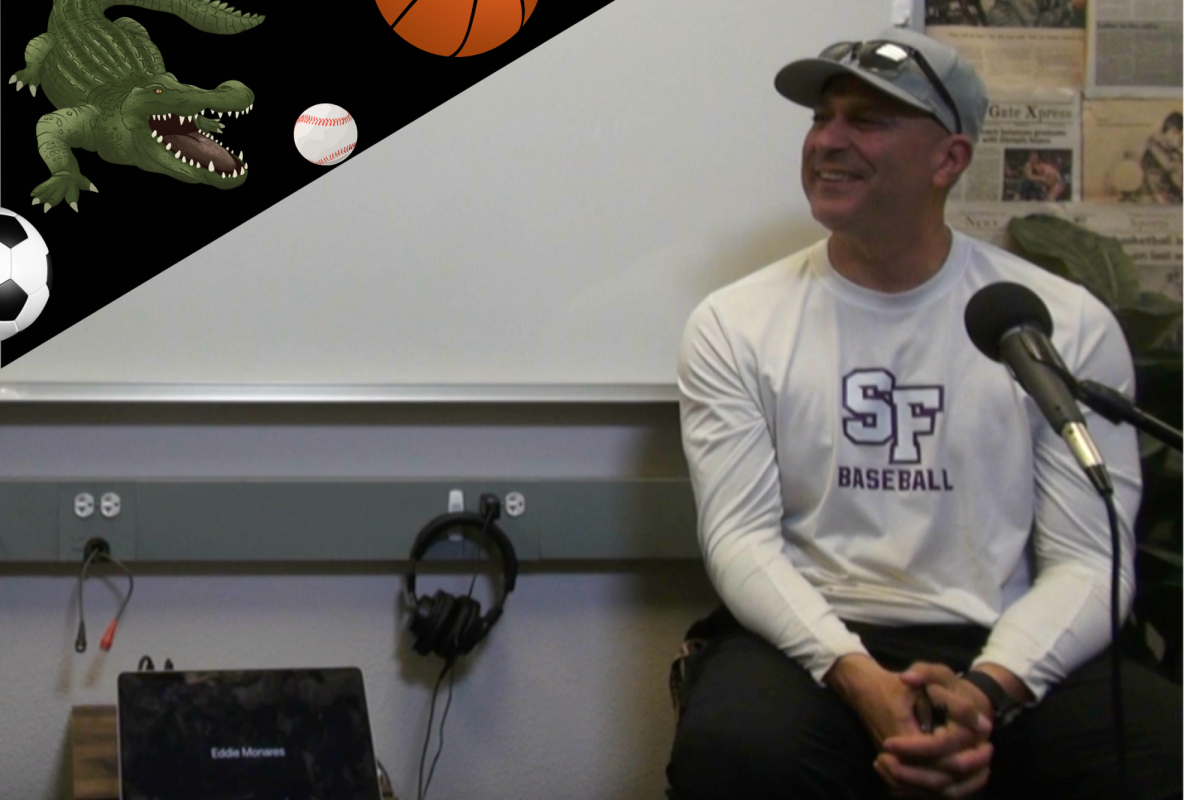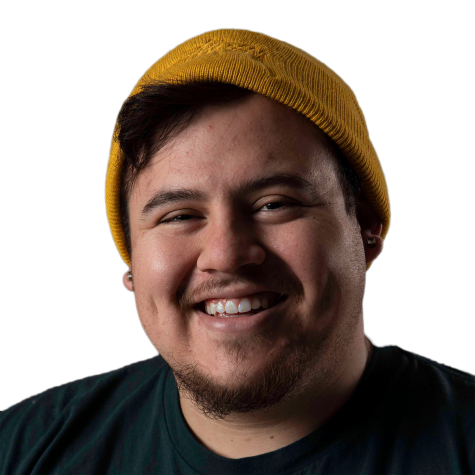Welcome to Gator Talk, a collaborative CalState podcast that brings city and statewide perspectives to SF State news.
SF State is one of the latest CSU campuses to become a mass COVID-19 vaccination distribution site and will have started vaccinating pre-selected students, faculty and residents by Feb 3. It was historic to see essential workers and politicians receive the vaccine but more historic to finally see the vaccine roll out on campus in our city.
In Gator Talk’s second episode, host Sebastian Mino-Bucheli talks with SF State Student Affairs & Enrollment Management Associate Vice Gene Chelberg about the vaccine rollout on campus, follows the process of being vaccinated with Vice president for Student Affairs & Enrollment Management, and in separate calls talks with the Daily Sundial Assistant News Editor, Trevor Morgan from CSUN and Staff reporter, Patrick Doyle, from SDSU, about CSU campuses hosting mass vaccine sites.
TRANSCRIPT:
Intro/ Monologue
*salsa song fades in*
Mino-Bucheli: This is Sebastian Mino-Bucheli, I’m your multimedia editor and your host for Gator Talk, a Golden Gate Xpress podcast that brings news to Sf State students.
For more information/coverage, check out goldengatexpress.org OR @GatorTalkPod on all
social media platforms.
Preview of the show
Mino-Bucheli: Here’s a quick preview of the show. I’ll be updating the audience with a quick news brief with news that happened this week that matters to SF State students.
Reporter Nick Mazzoni, Photo Editor Jun Ueda and I went to the SF State campus to work on the main story. I’ll later speak with a reporter from San Diego State University, the Daily Aztec and assistant news editor from Cal State University of Northridge, the Daily Sundial to get a different perspective of how the vaccine rollout is going.
*salsa song fades out*
—————–
News brief
Mino-Bucheli: February 1 marks the start of Black History Month, expect stories from our team of reporters to
highlight Black stories.
February 2 was Groundhog Day, we will have six more weeks of winter.
February 2 was Groundhog Day…again
Outdoor dining is open once again in San Francisco, however, the pandemic isn’t over. You
should consider double masking, due to the different COVID variants popping up in the states.
Feb. 12 is the last day to drop or withdraw classes without a W grade.
——————-
Main Story
Mino-Bucheli: I’m going to set the scene for the main story with the help of Golden Gate Xpress Campus
News Editor Jess Magill who wrote a brief over the weekend and Campus News Reporter
Nick Mazzoni’s story that will go live this week documenting the first day of the vaccine
rollout on campus.
*fade in another song*
Magill: Starting Wednesday, Feb. 3, SF State will be providing a space for COVID-19 vaccinations,
according to an update posted Friday afternoon by Student Health Services.
The vaccination program is being directed by the San Francisco Department of Public Health —
in conjunction with Safeway — which will be providing the medical personnel and vaccines. SF
State will be hosting the vaccination effort in the Mashouf Wellness Center every Wednesday and
Thursday.
According to Student Affairs & Enrollment Management Associate Vice President Gene
Chelberg, who has been actively engaged in helping to plan and shape the university’s response
to COVID-19, the campus will see up to 300 vaccinations per day.
“I think lots of us are excited that there is a vaccine or our vaccines are available now,”
Chelberg said. “And anything that we can do to help and support the distribution of the vaccine
is a win-win for everybody.”
In an email sent out by Student Health Services Director Roger Elrod, the department reiterated
that “while SF State is hosting the vaccination site, it is not responsible for determining
eligibility.” SFDPH is currently offering the vaccine to city residents or workers 65 and older,
as well as those with a high exposure risk.
SF State will be providing its facilities for vaccination free of charge, according to Chelberg,
although not without getting something in return. “In exchange, we are given the opportunity to
invite anyone affiliated with San Francisco State who meets the eligibility requirement to
register,” he said.
At about 3,500 cases per 100,000 residents, San Francisco fares better than the California
average of over 8,000. But with over 30,000 reported cases, and 317 deaths, San Francisco still
has a long way to go towards mass-inoculation. Only one week after the city announced its first
mass vaccination site, SF State has announced its intent to be a part of that effort.
Nick Mazzoni: At 8 a.m. the sun was fighting to break through SF State’s typically overcast sky.
A single-file, socially-distanced line of about 20 people started at the front door of the Mashouf
Wellness Center and it stretched to the sidewalk of Font Blvd., where people were patiently
waiting to receive their first COVID-19 vaccination.
Mino-Bucheli: SF State is one of the latest CSU campuses to become a mass COVID-19 vaccination
distribution site and will have started vaccinating pre-selected students, faculty and
residents by Feb 3. It was historic to see essential workers and politicians receive the
vaccine but more historic to finally see the vaccine roll out on campus in our city.
The San Francisco Department of Public Health working alongside Safeway
Pharmaceuticals will be overseeing the vaccine roll, providing medical personnel and
vaccine doses.
The plan to vaccinate eligible residents has fluctuated from the original posting in late
January. At the time of reporting, due to the low availability of doses residents that were 75
and older were deemed eligible. Due to the increased demand, Safeway Pharm has now
lowered it to residents who are 65 and older.
I spoke with Student Affairs & Enrollment Management Associate Vice President Gene
Chelberg, the go-to person for anything COVID-19 on campus.
(zoom call)
Mino-Bucheli: So I wanted to talk to you about the vaccine rollout at SF State this upcoming Wednesday. But
by the time the listeners get to listen to this, it’ll be Friday. What is this? First of all, how do we,
How did we get here? Certain CSUs were able to get the vaccine earlier. So if you could walk me through?
Chelberg: So you know some of the issues in the system have pretty involved relationships with their
local county and city Department of Public Health, so that they’re actually a site for mass
vaccines, whether it’s for the flu or something else. We have a really good working
relationship with SFDPH at San Francisco State, but we’ve never really been other than just
our limited student flu vaccine program that we run every fall, we have never been a big site for
the community for some campuses that actually regularly serve the community. So we
reached out.
President Mahoney asked us to reach out to the city and county of San
Francisco to see whether or not they would benefit from having a site, hosted at San
Francisco State and they were very excited to hear that we were willing to host the site. And
so then that happened in early January. And so we’ve been busy all month, working with the
San Francisco Department of Public Health and their contractors Safeway pharmacies to
make this happen on campus.
Mino-Bucheli: Thank you for that, and I know this is like a glaring blip on everyone’s, you know, laptop or
phone when they’re reading the news. Safeway pharmacies Right?
Chelberg: Right.
Mino-Bucheli: And I think that when we were in the newsroom we were like, so when we’re discussing this shoot
we never shouldn’t mention their name so many times, like is this like an ad for Safeway?
But this is just because it’s Safeway Pharmacy.
Chelberg: Right, so this is Safeway pharmacy so you know the safe, most Safeways have a pharmacy
inside the store. And they have contracted with the city and county of San Francisco to
provide mass vaccination clinics, and they will, it will be their staff who are providing the
injections. They will track eligibility, so they’ll do all that. All we’re doing is providing the
physical space, the maintenance and cleaning of the space. And we’re also providing student
volunteers to help staff, kind of manage the line, make sure people have their paperwork filled
out, checking people in. So, those are the pieces that we’re providing.
(Narration)
Mino-Bucheli: I went to the vaccine distribution site alongside reporter Nick Mazzoni, when it opened
Wednesday morning.
The goal was to interview the first two people receiving the vaccine but due to privacy and
consent issues, it was recommended by Safeway Pharmacy that I stopped recording video,
stop taking photos and have zero interaction with the patients as they rest for 15 minutes in
case there is a reaction to the vaccine.
To remain ethical, I have nothing to show for the podcast. What I can say is that it was
historic to witness – the first two people on SF State’s campus receiving the vaccine.
I was contacted by Gene Chelberg and AVP Michael Scott to meet Dr. Beth Hellwig, she is
the Vice president for Student Affairs & Enrollment Management and was slated to receive
the Pfizer vaccine at Mashouf Wellness Center.
Photo Editor, Jun Ueda and I waited for her arrival.
Mino-Bucheli: How are you feeling?
Dr. Hellwig: I’m so excited to be here, I’m so grateful for all the scientists who developed this vaccine.
I’m so happy about the University hosting it here and Safeway. I’m thrilled.
Mino-Bucheli: Where did you find it? When did you find out about the vaccine program being held here, at SF
State?
Dr. Hellwig: Well, I knew that because I’m the vice president. But at the administrative level, we’ve been
talking about. And so I found out about it last week. But I just found out I was going to be able to do it
yesterday. Originally it was 75 years and older. So I’m not that quite old. *laughs*
Mino-Bucheli: That was a clarification, I was looking for.
(Narration)
Mino-Bucheli: Dr. Beth Hellwig continued to finish answering a questionnaire about prior medical
history, Jun and I stayed with her as we got closer to the gym where her vaccine waited for
her.
Mino-Bucheli: Would you be the first one in your family to receive the COVID vaccine?
Dr. Hellwig: My brother-in-law in Florida has been able to get it. Other than him, I’ve been really happy.
Mino-Bucheli: You also don’t mind me asking, has anyone in your family been sick with COVID-19?
Dr. Hellwig: Yes.
Mino-Bucheli: And you of course have been playing it safe?
Dr. Hellwig: Oh my gosh, yes. I’ve been isolated. I’ve been working virtually since last February..so it’s been
almost a year. My sister, my brother in law and my nephew in Arizona, New Mexico all had the coronavirus.
Pretty severe cases. They’re doing well.
Mino-Bucheli: That’s good to hear. Yeah.
(Narration)
We got through another checkpoint and we were inches from the door for another
checkpoint. Photo Editor Jun was able to get window light portraits before we went in.
Mino-Bucheli: Are you afraid of needles?
Dr. Hellwig: I’m not fond of them. I think for half a minute of my life I can, I can deal with a little bit of pain for protection.
(Narration)
We were able to get full press access at her check-in. Where she was photographed
receiving the vaccine and she answered some questions. Dr. Beth Hellwig was able to receive the vaccine and recovered just fine. She’ll receive the second dose in about 3 weeks.
Amidst the positivity regarding vaccinations, there’s still the ever-present threat of
different COVID-19 variants popping up all over California and the rest of the United
States. Gene Chelberg tells me about how to go on with the ever-present threat.
Chelberg: Here’s the deal, at the end of the day right, the vaccine is awesome, and it will get us, eventually
to where we need to be. But even once you’ve been vaccinated you still need to mask, you still
need to physically distance, you still need to wash your hands, you still need to stay home if
you’re sick. Because, you know, it’s just a small percentage of people who have the vaccine. And
so folks are still going to be transmitting the virus.
And so the biggest thing is don’t stop doing what we’ve done so well at San Francisco State, we’ve done such a great job with our face to face, limiting our face-to-face interactions and the folks that have had been face-to-face, have
done such a great job of wearing face coverings, maintaining that six-foot physical distancing,
washing their hands, staying home when they’re sick, that our numbers are really low if you look
at our numbers compared to the rest of the CSU.
Our numbers are really low and we know some of that is people aren’t reporting. But we also know that, you know, folks are really taking this seriously and President Mahoney and her leadership team have really limited the numbers of people who are on campus and so we’re really proud of that and we want to stay that course
right we got to stay that course. And yeah, double massing. You know, it’s the next step.
Break
Mino-Bucheli: We’re gonna take a quick break.
Support the Golden Gate Xpress’ work by signing up for our online newsletter, following
us on Instagram or Twitter @ GGXnews and visiting the website:
https://goldengatexpress.org
Interested in advertising with GGX? Check out our advertising page on
goldengatexpress.org/advertising.
Our Editor-in-Chief, Chris Ramirez launched the First 100 project that chronicles
President Biden’s first 100 days in office. Check it out at
https://goldengatexpress.org/category/in-depth/
(will say “First 100 Project” since there’s no quick domain goldengatexpress.org/first100)
(break ends)
Mino-Bucheli: This is Patrick Doyle, he’s a staff writer with the Daily Aztec at San Diego State University.
Doyle: I’ve been doing a lot of coverage recently about the pandemic and how it relates to our
community. And I think it’s really cool then I’m going to be on your podcast and be able to tell
some listeners in San Francisco about what’s going on in other parts of California.
Mino-Bucheli: Patrick and I spoke about the situation in the city and county of San Diego where the
county is still at Tier 1 and cases are at 241,018, 968 new cases at the time of reporting.
I was following how San Diego State University is handling the COVID-19, previous to last
semester partying was frequent amongst students on campus. Now with the national
vaccine roll out – San Diego State is aiming to have in-person teaching.
There’s been an update to Patrick’s article… San Diego State is approved to begin
distributing the COVID-19 vaccine next week.
Mino-Bucheli: And with that also, I do remember reading your article that there is in-person teaching who is
going to move on to March right? It was delayed from February to March. And how’s that still
looking right now?
Doyle: Yeah, that’s right. Our in-person instruction, and keep in mind when we’re not on campus,
majority of us, there’s a very small population of SDSU that’s on-campus actually living there,
actually attending classes it’s mostly your bio majors, people who need to be at labs in person.
So for them, this is going to be a really big hit. It was originally they postponed it once until
February, I believe, and then they announced recently they postponed it again.
Now, it won’t be until March 1 that currently approved courses are going to be allowed to resume in person. So
until then, all those courses are going to be virtual. So basically everyone is on campus and
came to campus specifically for the reason that they had in-person classes, but again they just
have to wait, keep doing virtual learning until hopefully, March 1. I mean there’s a possibility to
delay it again, but I’m going to keep my fingers crossed and hope those case numbers don’t spike another
time.
Mino-Bucheli: I know, and maybe to the best of your ability. And that also goes with the student body reaction
to the vaccine rollout, and also the in-person teaching by March 1. If you could like, tell me how
that’s also going for students.
Patrick Doyle: The vaccine roll-out?
Mino-Bucheli: No, no. The in-person, like teaching.
Doyle: Oh, so I have a few people who are on campus. I knew more people last year who are on
campus, than sorry last semester that were on campus this semester. Because people kind of
learn like it kind of sucks to be on campus during a pandemic. Last semester I knew it was really
rough for people. A lot of the in-person classes while masked is required, people were frequently
seen without masks on campus. I can’t speak to the actual classrooms, but I’ve been to campus
recently, I’ve seen plenty of people without masks. It’s gotten to the point where people have
limited their enforcement of the rule. You know, occasionally, someone will say “put on your
mask,” but I’ve definitely seen groups of people walk by sec police and it’s not being enforced.
Not that I necessarily expected to.
(Narration)
Doyle: This is Patrick Doyle, reporting from San Diego.
But the good news is the majority of people are wearing masks, and it’s going well on the health
front. This semester, I mean, we’re still in an uptrend. As soon as you send out an email. On
January 22, with the data from the first semester just in the first few days of the semester, there
were three total positive cases among students associated with the campus housing center. Our
follow up email a week later said that number had increased to 18. So we’re already on the rise,
but the good news is, when you look at those numbers, they’re not as drastic of a spike as they
were in the fall semester. I believe we had over 1600 cases connected to San Diego State that
were reported, that was really bad.
Mino-Bucheli: The Cal State University of Northridge in LA County is one of the latest CSUs that opened
up to be a mass vaccine site. At the time of reporting, the Cal State University of Los
Angeles and the Cal State University of Long Beach have also opened up to distribute the
vaccine. 1 in 3 Angelenos are infected with COVID-19. I spoke with Trevor Morgan, he’s
the assistant news editor of the Daily Sundial, the newspaper of Cal State University of
Northridge.
Morgan: Yeah, sure. So, we get of and see some has been going back and forth on this like, whether we’re gonna
do in-person classes or not. And they’ve always leaned on the, on the side of that they’re not. I think a lot
of people were hoping that this semester was going to be in-person. But, you know, the grumblings and
the rumors and you know kind of what we’re hearing through the grapevine was that that wasn’t really
going to happen. And we’re going to be lucky if we get to it fall.
You know, and then we have a new president Erica Beck, and she sent out an email, and she said yeah there’s going to be some in-person classes this semester kind of like other was last semester. But things are going to pretty much stay the same. And she hopes that we’re going to go back to school, go back on campus in fall, but you know no
one gets to decide. When this happens, it’s kind of the virus that decides when we go back.
(Narration)
Morgan: This is Trevor Morgan, reporting for Northridge.
Mino-Bucheli: We should SF State students expect about having a mass vaccine center on campus?
Morgan: Well, I hope they think it’s a good thing. You know I, like I said, I don’t know how everyone feels about
what it’s like at CSUN, but I hope they think it’s a good thing too, you know, when we heard about it the
newsroom I can tell you how we all felt about it so it was pride for sure we were very happy to know that
it’s, it’s the big news of the campus is that we’re going to be, you know, making history, you know, be one
of the vaccine distribution points.
Hopefully, it’ll make it easier for people to get vaccines, hopefully it’ll be easier for students to get vaccines and the quicker that we can all get vaccinated we can all go back to school which is something, you know, we all want so badly. So, you know, people at San Francisco State, I hope they see it as a good thing and that you know it’s it’s our step closer, it’s our hope, or light at the end of the tunnel for, for going back to school,
To reiterate, by the time of reporting. The Cal State University of Los Angeles and the Cal
State University of Long Beach have also opened up to distribute the vaccine. And there’s
more to come from other CSUs.
End
Mino-Bucheli: And that was the episode. This is Sebastian Mino-Bucheli. I’m your multimedia Editor and your
host for Gator Talk. New episodes will premiere Friday mornings so stay tuned. And with that,
I’m signing off.





